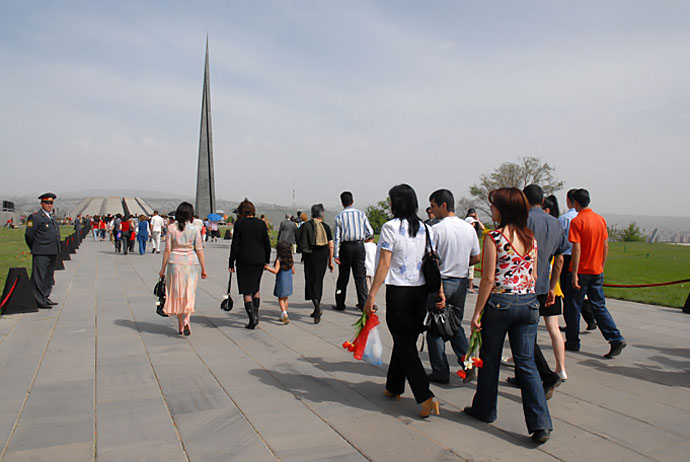
Following media reports earlier today that Armenian President Serge Sargsyan had "chided Turkey" for not seriously seeking to unconditionally open the border between the two countries comes unexpected news. Within the last few hours at time of writing, reports from the BBC, Reuters, AP and others now say that "domestic discussion" in the estranged neighbouring countries over two diplomatic protocols is set to start and will take up to six weeks.
The announcement comes just hours after the U.S. Ambassador to Armenia, Marie Yovanovitch, had also said she hoped "tangible process" would finally be registered in attempts to normalize relations between the two countries. The border between Turkey and Armenia has been closed since 1993 when the former sided with Azerbaijan in its conflict with the latter over the disputed territory of Nagorno Karabakh.
Over 1 million refugees and IDPs on both sides were forced to flee their homes with Armenian forces still currently in control of over 14 percent of Azerbaijan. Baku is therefore reported to be unhappy with increased international efforts to establish diplomatic relations between the two, and especially in the months following last year's much publicized "football diplomacy," until the Karabakh conflict is finally resolved.
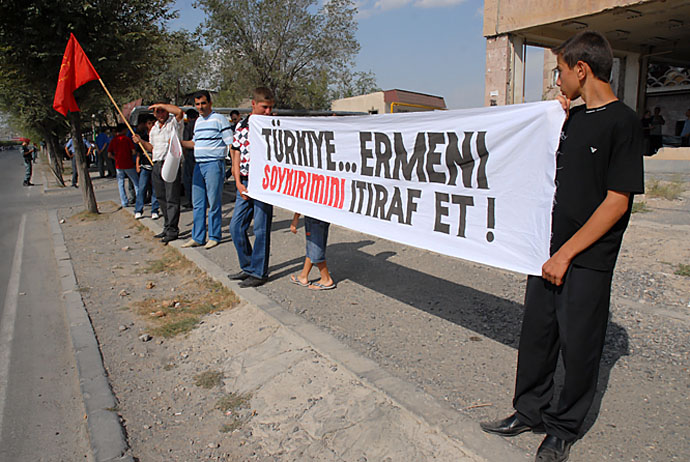
Armenian Revolutionary Federation -- Dashnaktsutyun (ARF-D) protest Turkish President Abdullah Gül's visit to Yerevan, Republic of Armenia © Onnik Krikorian / Oneworld Multimedia 2008
Attempts to re-open the border since the 1994 ceasefire with Azerbaijan, however, have also been frustrated by disagreemeent over the WWI mass killing and deportation of as many as 1.5 million Armenians in the Ottoman Empire in what most historians consider to be the first genocide of the 20th Century. In April, during an unprecedented speech in the Tukish National Assembly, U.S. President Barack Obama urged both sides to resolve their historical differences.
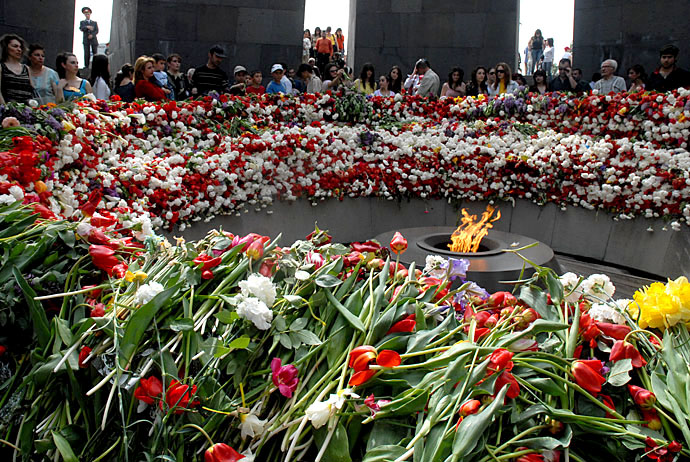
Tsitsernakaberd Genocide Memorial, Yerevan, Republic of Armenia © Onnik Krikorian / Oneworld Multimedia 2008
Even so, Obama had already disappointed many ethnic Armenians living in the United States by not officially recognizing the massacres and deportation as genocide, arguing that it is up to both countries to come to terms with their shared past. Now, with Swiss mediation, that looks closer to coming to fruition. Tonight, the Ministries of Foreign Affairs of Armenia, Switzerland and Turkey issued a joint statement.
The Republic of Armenia and the Republic of Turkey have agreed to start their internal political consultations on two protocols – the ‘Protocol on the establishment of diplomatic relations’ and the ‘Protocol on the development of bilateral relations’ – which have been initiated in the course of their efforts under Swiss mediation.
The two Protocols provide for a framework for the normalization of their bilateral relations within a reasonable timeframe. The political consultations will be completed within six weeks, following which the two Protocols will be signed and submitted to the respective Parliaments for the ratification on each side. Both sides will make their best efforts for the timely progression of the ratification in line with their constitutional and legal procedures.
The normalization of bilateral relations will contribute to the regional peace and stability. The Republic of Armenia and the Republic of Turkey are committed are pursuing their joint efforts with the assistance of Switzerland. link
Of course, the protocols will have to be ratified by the Armenian and Turkish parliaments and some analysts are unsure how the populations of both countries will greet this new development given the politicized nature of the media and among some segments of civil society. Nevertheless, for now, what mainly concerns outside observers is how some internal political forces will respond in a region where nationalist ideology is very much the dominant one.
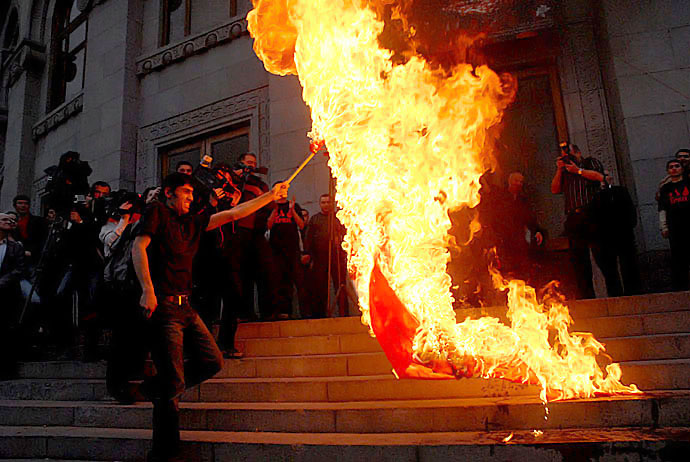
Armenian Revolutionary Federation -- Dashnaktsutyun (ARF-D) burn the Turkish flag, Yerevan, Republic of Armenia © Onnik Krikorian / Oneworld Multimedia 2008
In Armenia, for example, the Armenian Revolutionary Federation -- Dashaktsutyun (ARF-D), which opposes establishing diplomatic relations with Turkey as well as any compromise solution to the Nagorno Karabakh conflict, has already left the government coalition over the issue and called for an end to negotiations between Yerevan and Ankara. The nationalist political party has also demanded the resignation of the Armenian Foreign Minister although it did stop short of calling for the president to step down.
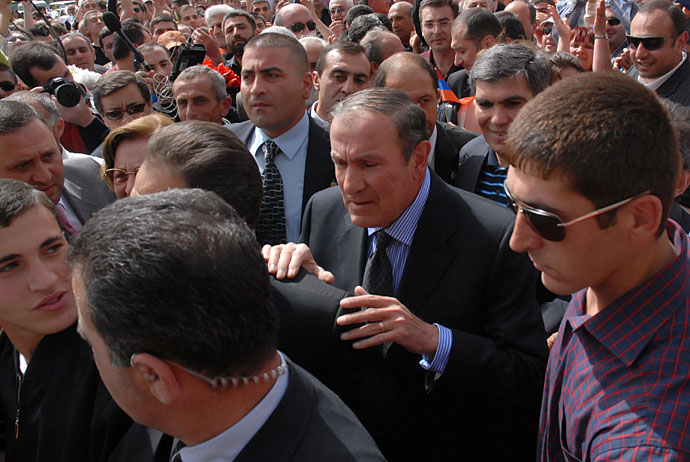
Former president and extra-parliamentary opposition leader Levon Ter-Petrossian, Tsitsernakaberd Genocide Memorial, Yerevan, Republic of Armenia © Onnik Krikorian / Oneworld Multimedia 2008
Another unknown remains the extra-parliamentary opposition led by former President Levon Ter-Petrossian who some suspect might be ready to exploit such a development despite having favoured establishing relations when in office. However, many diplomats in Yerevan, as well as domestic and regional analysts, doubt that either could pull enough supporters out onto the streets. In recent months, both have been unable to attract more than a few thousand people to protest rallies and demonstrations.
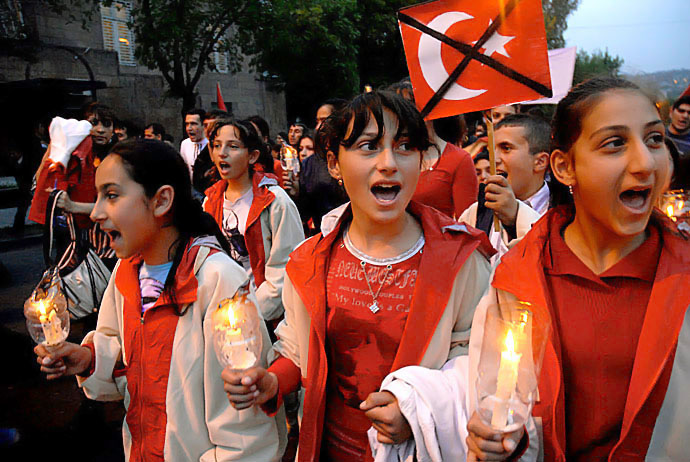
Armenian Revolutionary Federation -- Dashnaktsutyun (ARF-D) Armenian Youth Federation (AYF) march to Tsitsernakaberd, Yerevan, Republic of Armenia © Onnik Krikorian / Oneworld Multimedia 2008
Nevertheless, it also remains to be seen how harsh reaction will be from Azerbaijan as well as from nationalist circles in Turkey, but whatever happens next will have to by 14 October when the Armenian president is due to visit Turkey for a return World Cup qualifying match. Others will also be watching to see whether possible rapprochement will positively impact on the possibility of a framework peace deal on Karabakh if neither side gets cold feet as domestic discussion intensifies. Indeed, some consider that the move could contribute to peace and stability in the entire region.
Meanwhile, as more details emerge of what could be a historical deal in the making, the protocols are already online in PDF format on the Armenian Foreign Ministry web site.
Top Photo: Tsitsernakaberd Genocide Memorial, Yerevan, Republic of Armenia © Onnik Krikorian / Oneworld Multimedia 2008

The BBC has now updated its earlier report.